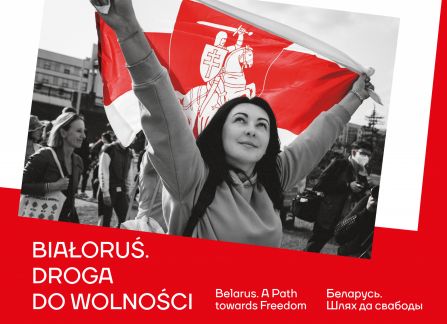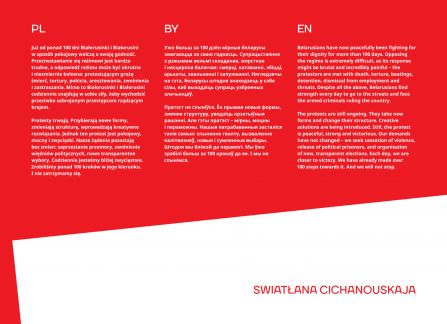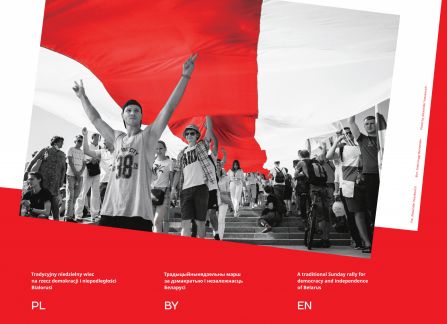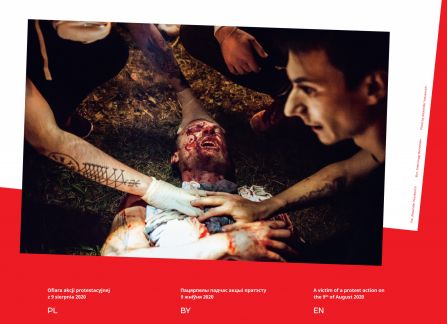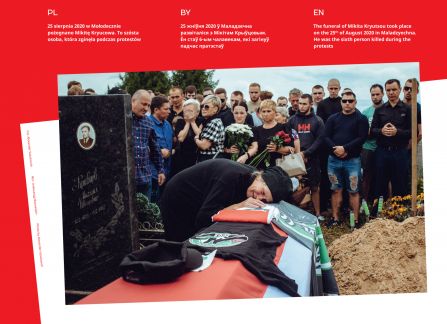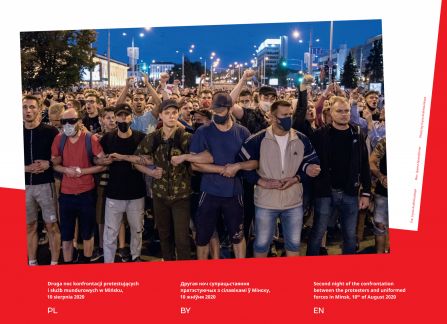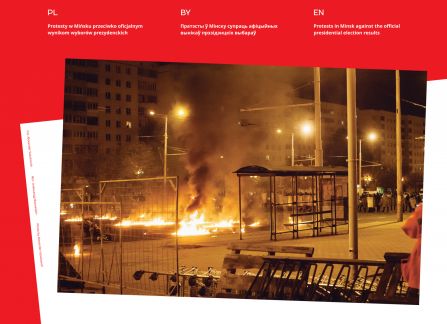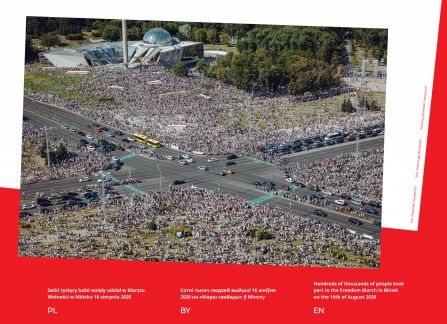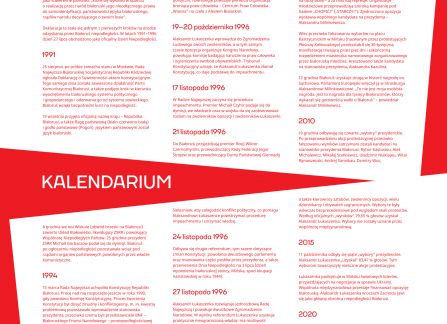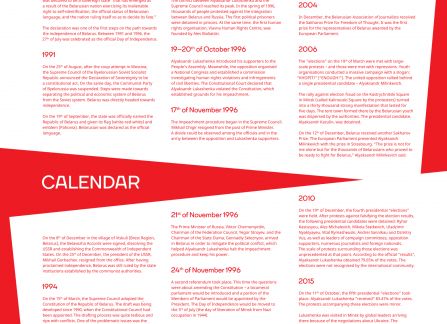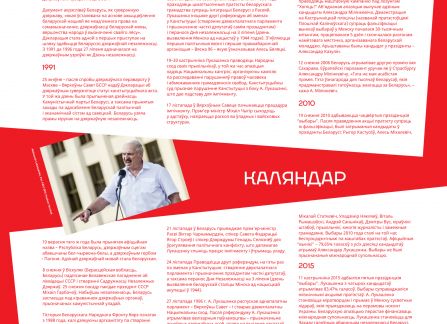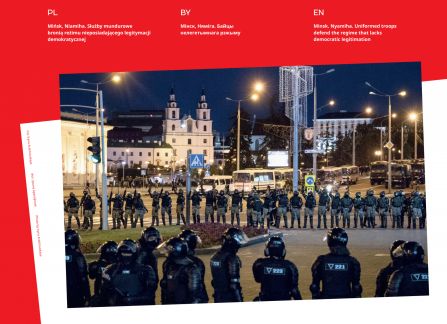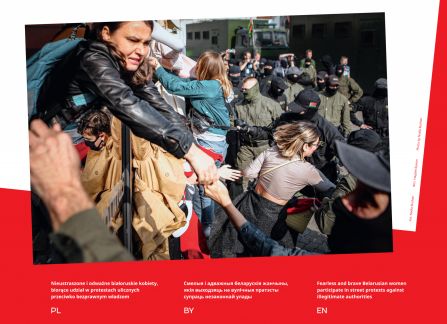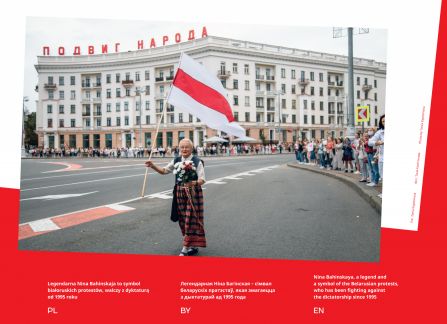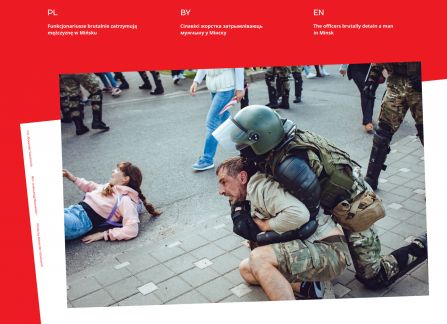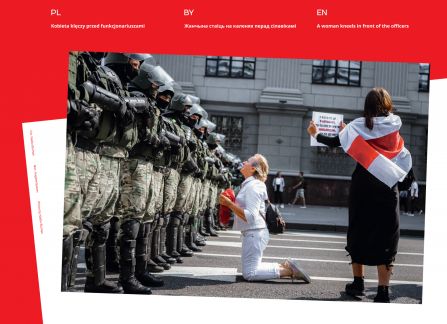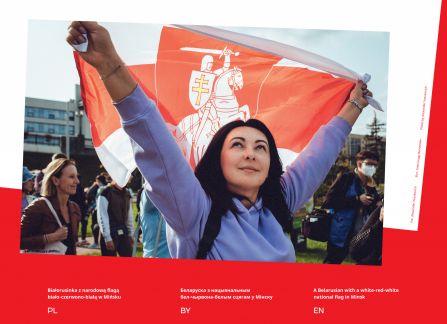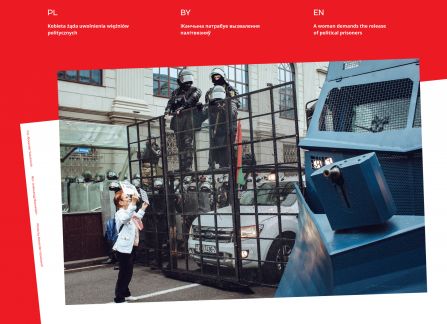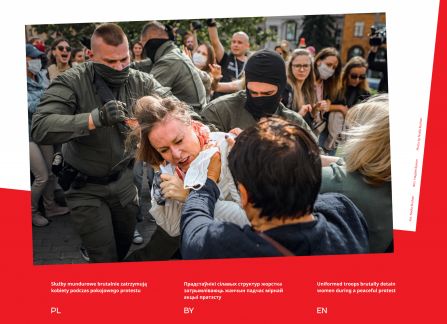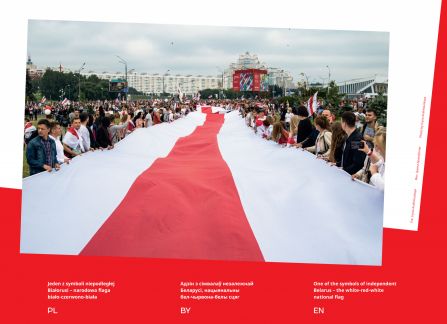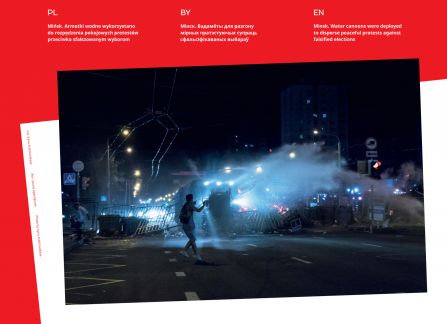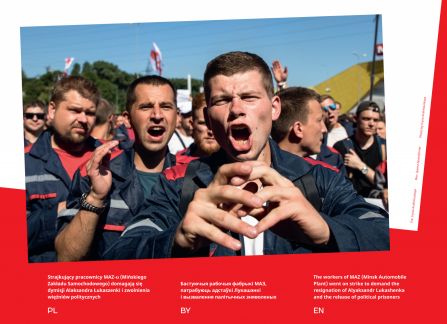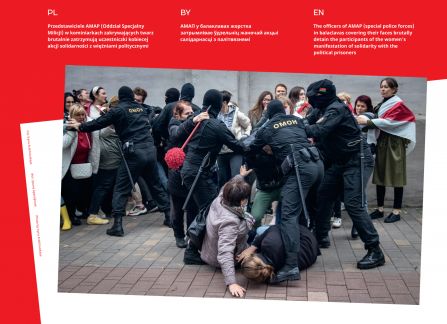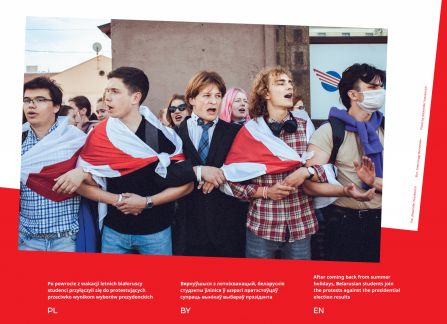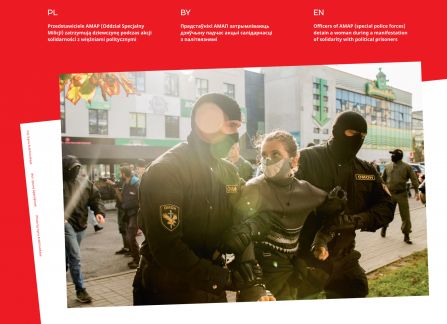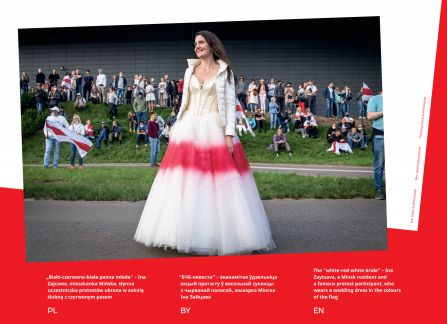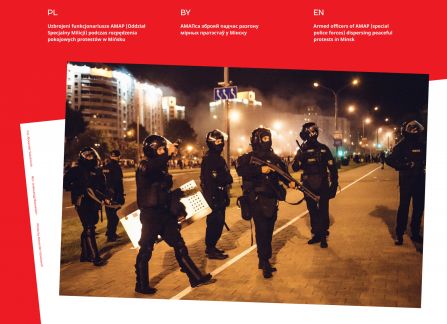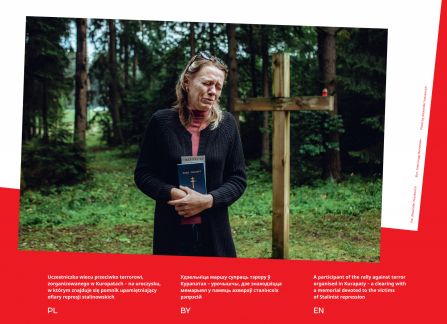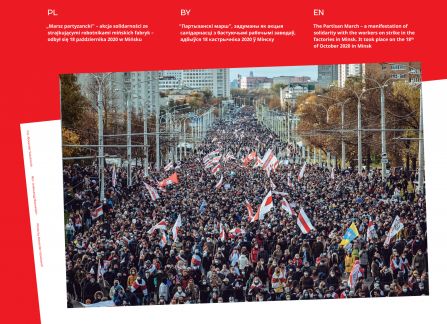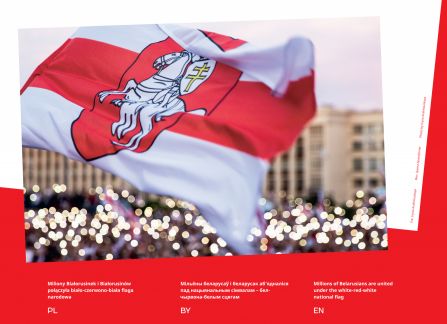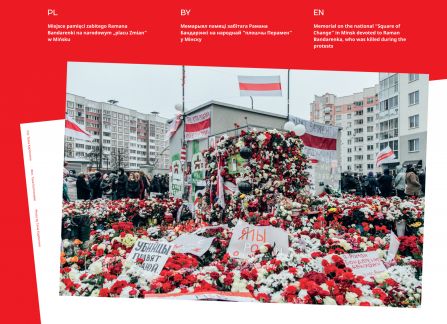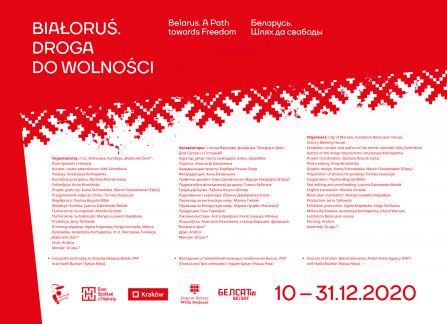Exhibition "Belarus. A Path towards Freedom" 10.12.2020
"Belarus. A Path towards Freedom" is an exhibition of photographs documenting the struggle of Belarusians - protests in the streets of Minsk, Grodno, Vitebsk, Mogilev, Brest and other small and large cities.
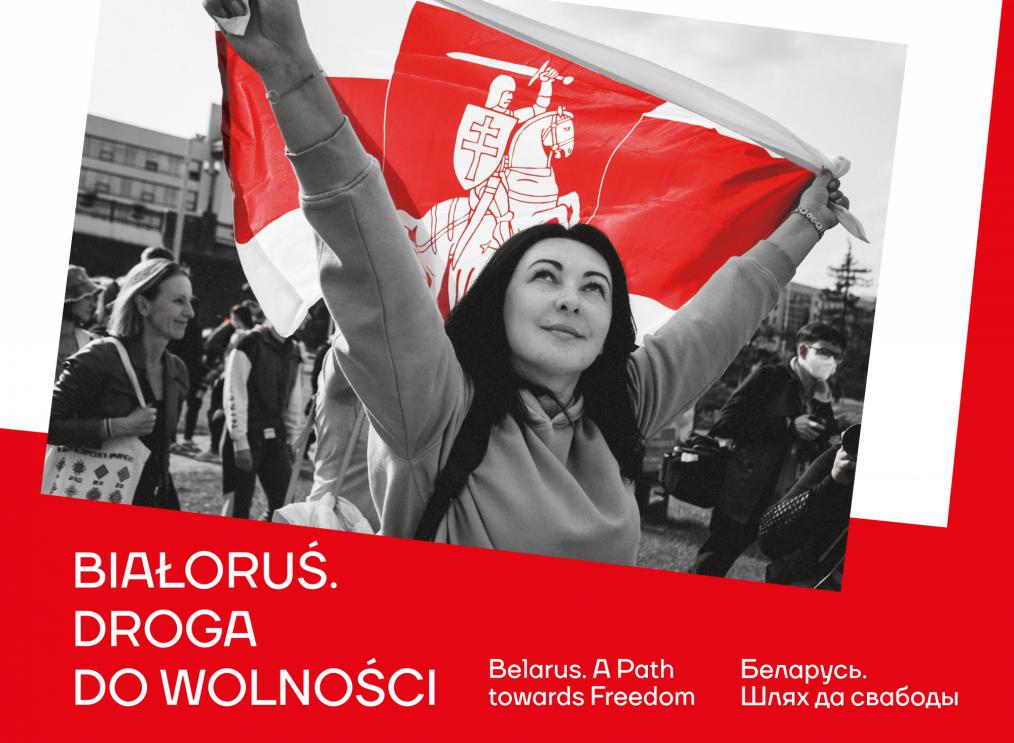
10 December is celebrated worldwide as Human Rights Day and the anniversary of the Declaration of Human and Citizen's Rights. 10 December 2020 is also the one hundred and twenty-fourth day of protests in Belarus. Belarusians fight for freedom, democracy and respect for their fundamental rights: free elections, freedom of speech and press, freedom of gatherings. Our neighbours want to live in a democratic country ruled by democratically elected people. Unfortunately, these rights are being violated and their basic civil liberties are now being taken away from them.
"Belarus. A Path towards Freedom" is an exhibition of photographs documenting the struggle of Belarusians - protests in the streets of Minsk, Grodno, Vitebsk, Mogilev, Brest and other small and large cities.
The photo exhibition, initiated by the Warsaw City Hall and the History Meeting House, will be presented in many Polish cities - in urban space or in a virtual version. The City of Krakow, in cooperation with the Villa Decius Institute for Culture, have also joined the project and prepared an exhibition in electronic form, which will be available for viewing on the website of the City of Krakow and the Villa Decius Institute for Culture.
"Belarus. A Path towards Freedom" is an exhibition of photographs documenting the struggle of Belarusians - protests in the streets of Minsk, Grodno, Vitebsk, Mogilev, Brest and other small and large cities.
The photo exhibition, initiated by the Warsaw City Hall and the History Meeting House, will be presented in many Polish cities - in urban space or in a virtual version. The City of Krakow, in cooperation with the Villa Decius Institute for Culture, have also joined the project and prepared an exhibition in electronic form, which will be available for viewing on the website of the City of Krakow and the Villa Decius Institute for Culture.
The letter of The Mayor of Krakow Jacek Majchrowski:
In the autumn of 1956, a great Polish poet, Zbigniew Herbert, wrote a poem dedicated to Hungarians who fought against the Soviet invasion. He wrote: “We stand at the border/ we reach out our hands/ and we tie for you brethren/ a big rope from the air / from the broken scream/ from the clenched fists/ a bell is cast and a silent/ heart to anguish.”
Today, 64 years after these events, history is repeating itself. Once again, we are at the border and look at out sister nation, our closest neighbour, as it fights. This time the enemy does not come from the outside. It is the dictatorship of Alexander Lukashenko, which Belorussians have been enduring for over a quarter of a century, and to which, on June 9, 2020, they said “enough is enough!”.
This day, after the results of the fraudulent election were announced, Belorussians took to the streets. Minsk, Grodno, Vitebsk, Mogilev, Brest, and other cities have been gripped by a huge, nationwide wave of protests. At the same time, the terror of the government’s law enforcement forces has intensified. For many weeks now, not only all opposition movements and independent journalists but also ordinary citizens are constantly subject to harsh repressions. 72 years after the adoption of the declaration of human rights, in Europe, right at the border with the European Union, people disappear from the streets, are being detained on a mass scale, tortured, and killed.
In August and September, Krakow, like many other Polish cities, took the colours of the historic Belorussian flag, the carrying of which, for many years, is a punishable offence in Belarus. The city’s representative buildings were lit with white and red and white light, reminding us of the dramatic situation beyond our eastern border, and demonstrating our support for the Belorussian people fighting for freedom and for their inalienable rights.
The initiative of Unia Metropolii Polskich – a photography exhibition illustrating the path of Belarus to freedom – is nothing more than another important gesture by which we express unity and solidarity with our heroically protesting and persecuted neighbours.
By launching this exhibition on December 10 – the International Day of Human Rights – we pay tribute to all those who stand against lawlessness and fight to ensure that the Universal Declaration of Human Rights, signed in 1948, is not just a luxury privilege of few.
The exhibition in Krakow was not by chance organised by Villa Decius. We wanted the voice of support for the protesters to come from this place, from our European salon, where European elites regularly meet, a centre that promotes the idea of pluralism and democracy, which receives persecuted artists and scientists.
The whole free world is looking at Belarus. We are very impressed by the courage, the consistency, and the patience with which the defenders of democracy fight there every day, and the composure with which they respond to the brutal attacks and aggression. We express solidarity not only with the aim, but also with the peaceful methods that they have adopted against the violence of the regime.
We do not know how long the path to freedom is before Belarus, but one is certain – we must not remain silent, we must not leave our neighbours alone. It is our duty to ensure that the protesting Belarus is remembered at all times.
Today, as it was over 60 years ago, “we stand at the border”. And we reach out our hands in the gesture of memory and solidarity. This is not a gesture of helplessness. This is a contemporary dimension of the old motto: “for our freedom and yours”.
We believe that this story will end well and our support will contribute to the victory of good forces in this uneven fight.
Organizers: City of Warsaw, History Meeting House
Partners: City of Krakow, Villa Decius Institute for Culture
Fot. ©Biełsat
Today, 64 years after these events, history is repeating itself. Once again, we are at the border and look at out sister nation, our closest neighbour, as it fights. This time the enemy does not come from the outside. It is the dictatorship of Alexander Lukashenko, which Belorussians have been enduring for over a quarter of a century, and to which, on June 9, 2020, they said “enough is enough!”.
This day, after the results of the fraudulent election were announced, Belorussians took to the streets. Minsk, Grodno, Vitebsk, Mogilev, Brest, and other cities have been gripped by a huge, nationwide wave of protests. At the same time, the terror of the government’s law enforcement forces has intensified. For many weeks now, not only all opposition movements and independent journalists but also ordinary citizens are constantly subject to harsh repressions. 72 years after the adoption of the declaration of human rights, in Europe, right at the border with the European Union, people disappear from the streets, are being detained on a mass scale, tortured, and killed.
In August and September, Krakow, like many other Polish cities, took the colours of the historic Belorussian flag, the carrying of which, for many years, is a punishable offence in Belarus. The city’s representative buildings were lit with white and red and white light, reminding us of the dramatic situation beyond our eastern border, and demonstrating our support for the Belorussian people fighting for freedom and for their inalienable rights.
The initiative of Unia Metropolii Polskich – a photography exhibition illustrating the path of Belarus to freedom – is nothing more than another important gesture by which we express unity and solidarity with our heroically protesting and persecuted neighbours.
By launching this exhibition on December 10 – the International Day of Human Rights – we pay tribute to all those who stand against lawlessness and fight to ensure that the Universal Declaration of Human Rights, signed in 1948, is not just a luxury privilege of few.
The exhibition in Krakow was not by chance organised by Villa Decius. We wanted the voice of support for the protesters to come from this place, from our European salon, where European elites regularly meet, a centre that promotes the idea of pluralism and democracy, which receives persecuted artists and scientists.
The whole free world is looking at Belarus. We are very impressed by the courage, the consistency, and the patience with which the defenders of democracy fight there every day, and the composure with which they respond to the brutal attacks and aggression. We express solidarity not only with the aim, but also with the peaceful methods that they have adopted against the violence of the regime.
We do not know how long the path to freedom is before Belarus, but one is certain – we must not remain silent, we must not leave our neighbours alone. It is our duty to ensure that the protesting Belarus is remembered at all times.
Today, as it was over 60 years ago, “we stand at the border”. And we reach out our hands in the gesture of memory and solidarity. This is not a gesture of helplessness. This is a contemporary dimension of the old motto: “for our freedom and yours”.
We believe that this story will end well and our support will contribute to the victory of good forces in this uneven fight.
Organizers: City of Warsaw, History Meeting House
Partners: City of Krakow, Villa Decius Institute for Culture
Fot. ©Biełsat


